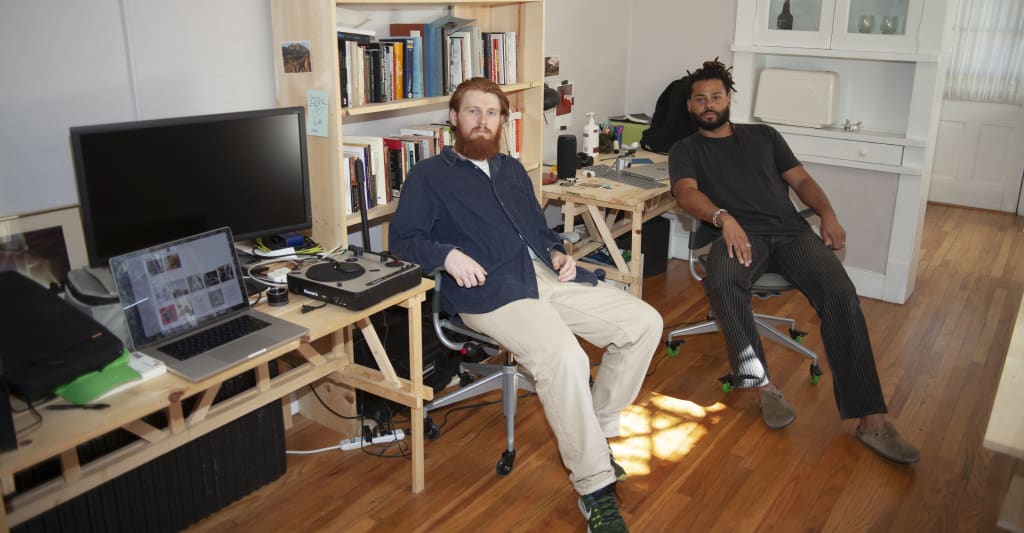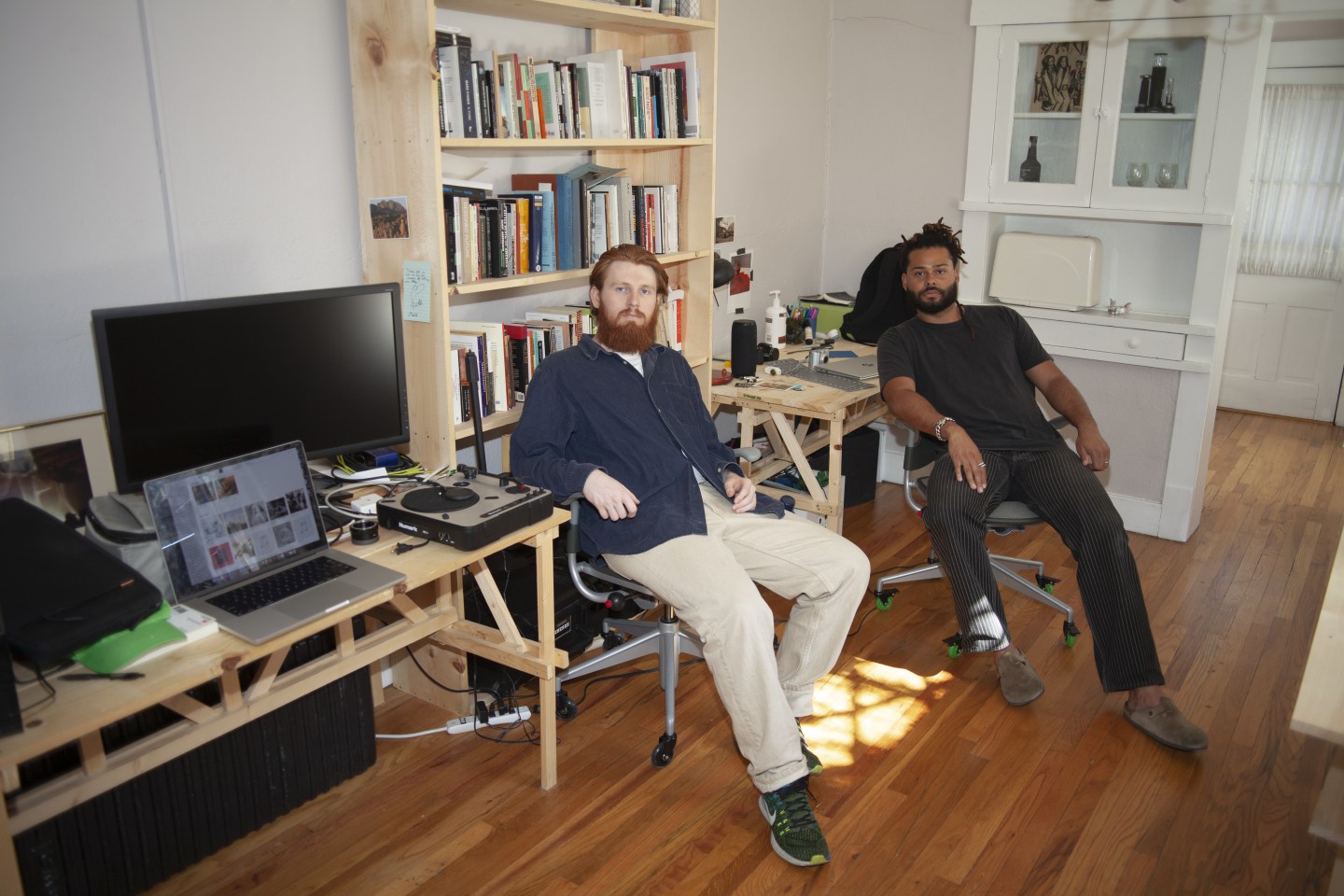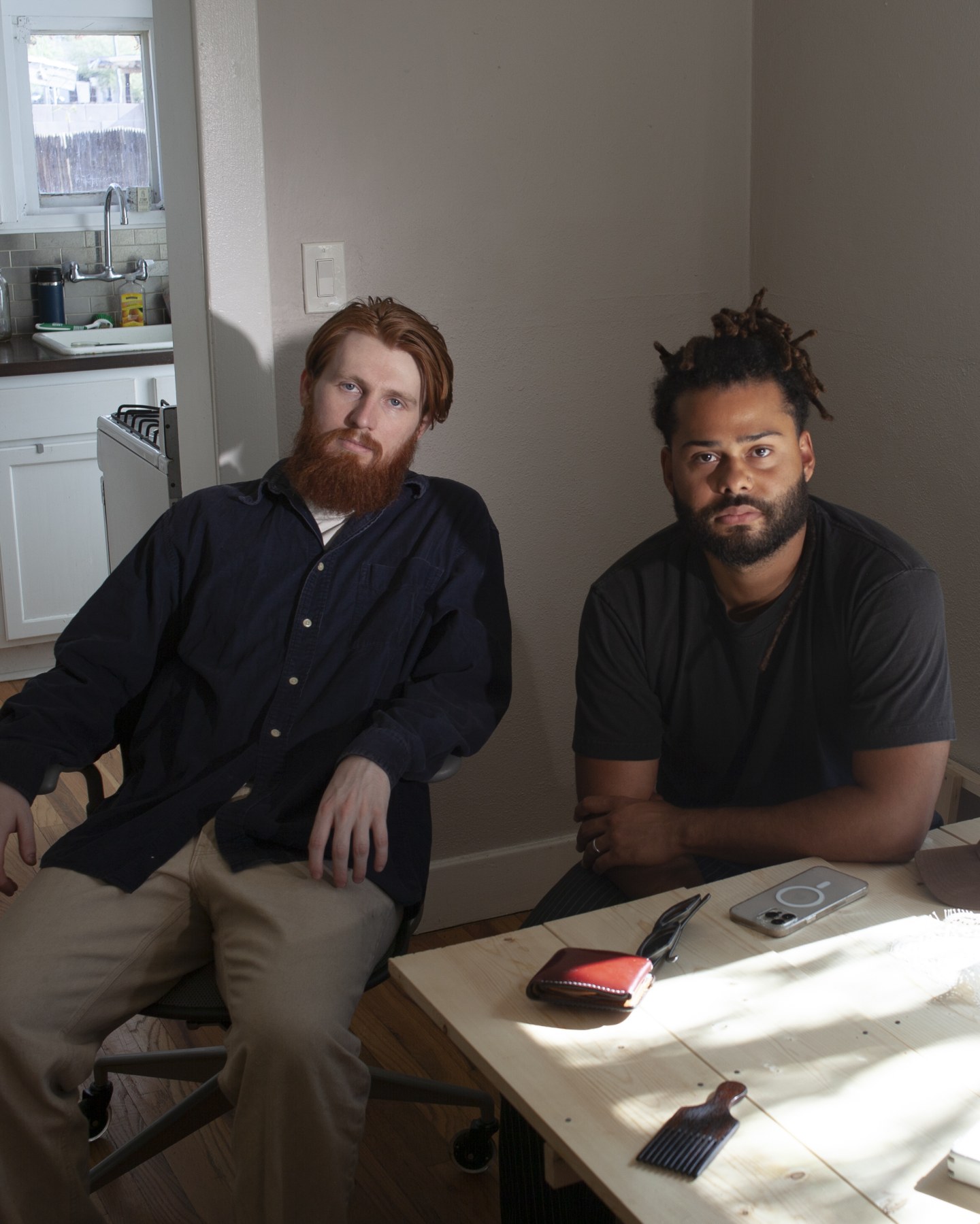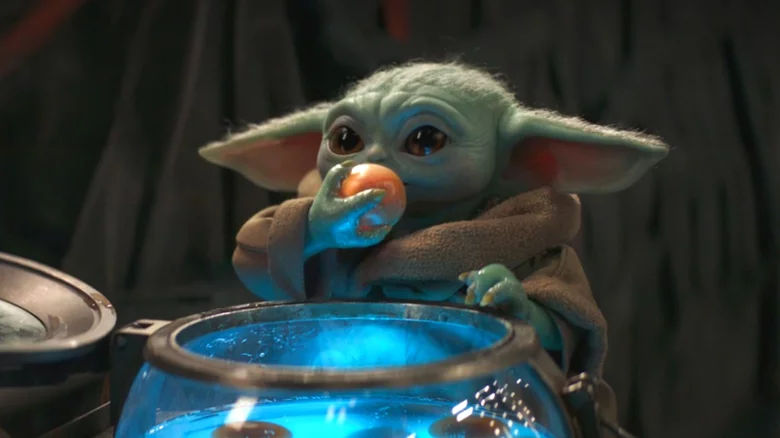#RIP Injury Reserve, long live By Storm


Photo by Parker Corey
Injury Reserve — the trio of Stepa J. Groggs, Nathaniel “RiTchie” Ritchie, and Parker Corey — pulled off the remarkable feat of becoming more avant-garde musically as their popularity and stature grew. A group that started out as acolytes of De La Soul and A Tribe Called Quest on 2015’s Live From The Dentist Office evolved into purveyors of dense noise rap and unearthed a community in the margins.
2021’s By The Time I Get To Phoenix was released in the aftermath of Groggs’s untimely death at 32 a year earlier. It came to be seen as something of a farewell to the rapper but, in reality, was mostly written and recorded while he was still alive. As such, RiTchie and Corey hadn’t yet created anything new without their best friend and former collaborator.
There is no truly satisfactory way to operate in the wake of such a loss. Simply carrying on can look cold-hearted, while ending a group suddenly may be unsatisfactory to fans seeking closure. Two years later, RiTchie and Corey have found a new way to move forwards. It came earlier this month in the form of a 10-minute-long music video. The first half comprises candid footage of Groggs in the good times, soundtracked by Injury Reserve’s “Bye Storm,” the closing song on By The Time I Get To Phoenix. The latter half is a new song, “Double Trio,” their inaugural single as a duo under the moniker By Storm.
RiTchie and Corey are reluctant to say at this stage whether there will be more By Storm music. For the time being, they just want to let “Double Trio” breathe. It’s a song that requires space, too. The emotions that run through RiTchie’s lyrics start out raw: He’s kept awake by the pain of Groggs’s loss. Corey’s beat, like a billowing cloud of smoke, cloaks RiTchie’s words and matches his darkness bar for bar. Slowly, though, the grief transforms into a unique form of energy, and the song evolves into something akin to a pep talk. It’s a remarkable moment that acknowledges the past while finding room to step bravely into the future.
Shortly after the video’s release, jumped on a call with RiTchie and Corey to discuss the metaphorical passing of the torch from Injury Reserve to By Storm, expand on the process of making their new music, and look back at the previous decade of their work together.
This Q&A is taken from the latest episode of The FADER Interview podcast. To hear this week’s show in full, and to access the podcast’s archive, click here.
The FADER: You toured immediately after the release of Injury Reserve’s last album. That was a charged time for you both, and I was curious as to what your memories of that tour are.
Nathaniel Ritchie: I remember going into it not knowing what the heck was gonna happen and how it was gonna be received. We entered the tour very delicately. It was our first creative statement post the passing of Groggs, so we wanted to have as much control as we could. We realized the live performance was best as a single piece, playing the record front to back. That allowed us to focus on the music, and not necessarily to not face what was happening, but it made us a bit more comfortable when the room was completely smoked out. It was a difficult situation, but I feel like we managed it as well as we could.
Did you feel any change in the dynamic between yourselves and the fans on that tour?
NR: Definitely. You could really feel prior to this that people just wanted to have a good time, and we were their outlet for that; this felt like they were taking in every moment and realizing that everything we were doing was a conscious decision. People were still having a good time and expressing themselves, but you could tell they realized this was a sensitive space.

Parker Corey
“Sometimes you learn way more on tour than in the studio.”
“Double Trio” is your first music under the name By Storm. How were you feeling in the run-up to its release and in the immediate aftermath? Were they very different states of mind?
NR: We were anxious to put it out because it’s important to us. At the same time, we wanted to make sure everything was perfect, because this is a lot more than just a new song. We wanted to make sure this transition showed a lot of respect for the last eight years, and I’m really happy with the way that it worked out. I’m happy with the way that Parker directed the video, with all the events we did — the premiere in L.A. and with Harmony Holiday [where we got to] really lay out what this is about, and [the exhibition] in Phoenix where we were able show every single IR video chronologically leading up to this at a movie theater. The new song is a statement itself, but it’s nothing without the past eight years.
Parker Corey: I’ve been having to remind myself that it’s a single. We spent so much time on it and it’s so dense, I forget that there’s not gonna be a proper suite of reviews coming out. It’s in a weird in-between place. A lot of the people who are interested in what we’re doing at this point are people who are also invested in the album format, but the reception of the song itself has been incredible.
NR: It’s easy to take a step back, like, “There’s probably a better way we can modify this for the modern standard,” but it just doesn’t work for this. It’s very particular to us, and it’s just the right thing to do. I think it’s literally perfect. We appreciate that people are open to consuming it the way we’re trying to put it out. The people who support us realize we’re sometimes gonna do things a bit untraditional. They’re not the type of people to expect a project every year.
Was “Double Trio” a hard song to write? It feels like there’s a lot of time and life in this song, so I wanted to talk about the journey of writing these lyrics.
NR: There was nothing difficult about this one. The feeling is undeniable in the production. It’s one of those songs where the journey already existed, and I was building off of that. With the first [two minutes] and how it drops into the sample being more straightforward, my reaction that you’re hearing on the record is my reaction when I was making it live. The beat started and I was doing the delay section, which is my favorite writing in the song, and the beat dropped, and it just… There are some songs where the production is so undeniable that your reaction to it makes anything that would be difficult content-wise so easy, because you can embrace the moment and what’s going on.
Then again, I see the content of the song being rather positive, so if anything, it made it easier to write through. To answer your question, I had a really fun time writing the song. It was pretty quick. I did it in four hours and sent it, and then Parker added the ending to it, and then I wrote to that another time. If you can embrace the moment and let your writing be driven by the production, you don’t look at the writing process as a daunting task. It’s really just finishing off the product.

Parker Corey
Parker, you directed the video for the Injury Reserve track “Bye Storm” and the By Storm track “Double Trio.” Can you talk about the concept of this quite long video and how it captures the “hello, goodbye” nature of the new material?
PC: We had the general form — the idea of doing a double video for [both songs] — in mind before we made the new song. It wasn’t the most conceptual; it was very instinctive. I was looking at all this old footage we had, and I realized, “Okay, this is what the video will be.” It would be easy to latch on after the fact and place some concepts, but that would be secondary to seeing the images.
NR: You know what’s funny about that? That’s exactly the process of writing the music as well. A lot of people dive into the conceptual aspect of the music — the writing and even the sample choices. Everything that we do is thoughtful, but most things are very instinctual. It’s a lot easier for me to make interesting vocal cadences and melodies if I’m instinctually reacting to something with the mic on.
As the final track on By the Time I Get to Phoenix, “Bye Storm”/By Storm fits very nicely as the transitional moniker; it has elements of the past and also fits the present. Could you tell me about the significance of that song? You’ve described it as a point of comfort for yourselves and your friends. And here’s that lyric, “the show must go on,” which you can hold onto as a fan.
PC: It felt like the most gentle handoff. It’s kind of a confusing band name too, which I don’t mind. I think confusing is good, for the most part, because everything is talking down to you like you’re a baby now. Even with that line, the [lyric[ right after it is “I don’t know.” The “I don’t know” side has always been just as much a part of all of these decisions.
NR: People pick and choose what’s an important lyric and what’s not. Like Parker said, it’s the last song, it’s a cool title, how perfect is that? We love the way the song feels, so I think we just lucked out. The cards were laid out for us. No one was thinking about anything else. While people have always loved the IR name, we’ve felt — maybe just because we were kids when we came up with it — like maybe it didn’t fit us.
You’ve been very clear that this is a one-off currently: This is what it is, and the future holds whatever the future may hold. Beyond specific plans, do you have ideas as to what you, individually or together, want to do in the future? Presumably you’ll both carry on making music. Are you able to talk, in the broadest sense, about what you hope to achieve?
NR: We don’t have an exact creative direction that we know we want to go. We liked how the last album had a very focused direction, so I think it’s as simple as finding that and building off of that. The way this career works, you’re always continuously thinking about this. You may not always be in the studio making sounds and writing lyrics, but it’s always gonna be a continuous thing you’re thinking about — where you wanna land in all of this and how you wanna lead it and push it forward.
If we’re gonna do something, we wanna do it the right way. Once we find it, it’s all forces ahead, but we aren’t necessarily there right now. We haven’t figured out that exact thing we wanna grow off of.
PC: I feel like I was subconsciously waiting for [“Double Trio”] to come out to feel out what there was to latch onto in it. It’s so out there production-wise. There’s stuff I like about music that I had to be willing to sacrifice to let it sound weird in certain parts — textures and mixing and stuff. To know that people are excited by that and comfortable with that when even I’m like, “Does this part sound good?,” it makes it more comfortable to circle back on something like that. I honestly think it’ll be easier to make new stuff now.
It’s somewhere between individual and together. There’s nothing planned right now, but I wouldn’t mind doing some smaller shows and starting to create a space as By Storm live, to troubleshoot that in more intimate settings. At the same time, there is — I’m trying to be vague — a very large undertaking that we’ll have two weeks of hell on in about a month that I’m very scared but excited to do, so there are some other daunting things going on as well.
“ If you can embrace the moment and let your writing be driven by the production, you don’t look at the writing process as a daunting task. It’s really just finishing off the product.”
This release feels in keeping with the way you’ve always been. You’re not just holding hands, saying, “Don’t worry, we’re not going anywhere,” and it’s refreshing. It’s a little bit confusing, it’s a little bit alienating, but in a really interesting way. Do you feel like the last few years have vindicated your approach for the previous decade?
NR: Because things have gone well, yeah. I wonder where we’d be if people didn’t like the last record. We’d been through a lot with that record, professionally and interpersonally. By the time it came out, we were stern on our stance internally with no clue how it [would be received]. The way it went, the way the live shows went, and even now, the way this new song’s going, people perceiving it the right way, it just reinforces that we don’t need to do anything but what we want to do creatively. If we give our all and are focused on something, people will be open to it.
PC: With the new song, by all accounts, I probably should’ve spent six months listening to post rock: “We’re gonna find another sample. We’re gonna be the post rock [rap group].” That would’ve been the sensible thing to do, I guess. The reception of this one has been a good sign that, even when you find something very distinct and you put it out there, people won’t latch on too much to that singular flash of something and then expect you to make watered down versions of it for five years.
NR: Historically, we’ve been fighting against what people are identifying as the Injury Reserve sound. Doing that, people have gravitated toward the approach and the mentality instead of one particular sound. And because of that, here we are once again pushing in a different direction, and people are into it. I think it would be different if it didn’t always sound really good, so I guess we’ll just do it until it sounds like shit.
PC: A lot of people pay lip service to these kinds of things — “The next album, you aren’t gonna like it, but I don’t care” — but they’re really just trying on a different style that’s like someone else’s. I think we’ve more and more been able to find out how to actually do that. [“Double Trio”] was also nice because it was cyclical, in a way. Our very first music was basically just us being really big Tribe and De La fans. Eight years into making stuff and picking up so much, this new debut single being on some levels just a jazz rap song is nice. It lays bare the journey — or maybe even growth, if someone wants to call it that.
Now that you’re a few years down the line and can look back at IR with a bit of distance, what makes you most proud about the things you achieved with Groggs?
NR: I’m proud of us navigating this landscape in our own way, building things up the only way we knew how, playing our own game. I’m happy we stayed true to who we were and stayed competitive internally and externally, that we were able to put something out there that was worthwhile to consume. We’ve always sat in the mindset that if it’s not gonna be its own thing, there’s really no point of it existing. We’ve never looked at this group as any type of placeholder or something to reinforce any particular scene, because you live by the scene, you die by the scene.
PC: One thing that’s easy to be really happy with is the restless posture that we had the whole time. The first thing we did that got any sort of traction was labeled as jazz rap, and the first single after that, [“Oh Shit!!!,”] the hook was like, “This is not that.” That was a mission statement.
If you liked the article, do not forget to share it with your friends. Follow us on Google News too, click on the star and choose us from your favorites.
For forums sites go to Forum.BuradaBiliyorum.Com
If you want to read more Like this articles, you can visit our Social Media category.




